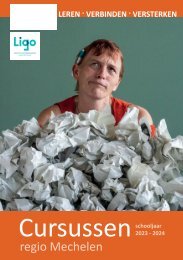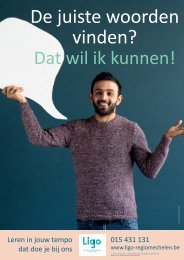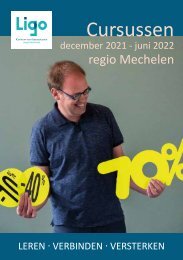EU-Brochure
Create successful ePaper yourself
Turn your PDF publications into a flip-book with our unique Google optimized e-Paper software.
Ligo is the learning partner<br />
for all low-literate adults,<br />
regardless of their mother<br />
tongue.<br />
“<br />
Litteracy affects people’s self<br />
image, their interaction with<br />
others, their well-being and<br />
their employability. The more<br />
literate society is, the stronger<br />
it is to face the challenges of<br />
the future.”
In this brochure you will discover how Ligo<br />
makes a difference for our target group. You will<br />
be introduced to our sector and the role that we<br />
play in the integration process of new non-native<br />
speakers in Flanders and Brussels.<br />
01<br />
02<br />
03<br />
04<br />
05<br />
Learning at Ligo<br />
What do we offer?<br />
Target group<br />
Why is there a need for Ligo?<br />
Ligo as a network<br />
Figures about Ligo<br />
About us<br />
What is there to know about our region?<br />
Joining Ligo<br />
How do people get to Ligo?
Ligo is Esperanto for ‘Connect’. That is exactly what we<br />
do, making connections between course members<br />
and society, with partner organisations and within<br />
our own organisation<br />
Therefore our credo is:<br />
Learn, Connect and Strengthen<br />
30<br />
years of experience<br />
13<br />
centres spread across Flanders and Brussels<br />
1<br />
strong name that connects the network
Learning at Ligo<br />
What do we offer?<br />
Agogic vision<br />
Our agogic vision is committed to empowering<br />
low-literate adult learners and the society. We<br />
work in an integrated and functional way on<br />
basic competences tailored to the learning<br />
needs of our target groups. Preferably, we work<br />
together with partners to best support our<br />
learners in their daily environment.<br />
We distinguish various learning areas:<br />
ABC<br />
Dutch second language for illiterate people<br />
Dutch for native speakers<br />
Information and communication technology<br />
Dutch second language<br />
Social orientation<br />
Languages<br />
Mathematics
Testimonials<br />
ABC<br />
“Now I dare to speak more Dutch<br />
and I enjoy connecting with<br />
other people.quote.”Course<br />
particpants<br />
“I learned to look up where<br />
and when I can take a bus.<br />
That way I get to many more<br />
places.”Course particpants who<br />
took classes facilitated by their<br />
employer<br />
“Through Ligo, I got my driving<br />
license. I become more<br />
self-reliant. I took a stress<br />
management course. Now I<br />
have become calmer.” Course<br />
participants about social<br />
orientation lessons<br />
“I learned to deal with my budget.<br />
Now I can check my bills<br />
myself.” Tom took maths lessons<br />
“When I had to write a report<br />
at work, I deliberately poured<br />
coffee over it. Nobody noticed<br />
that I couldn’t write well. Now I<br />
can do a bit more every week.”<br />
Ronny took classes ‘Better<br />
reading and writing’<br />
“I can now whatsapp with my<br />
grandchildren myself, even<br />
sending e-mails with the<br />
computer is already working<br />
quite well.” Students about ICT<br />
lessons
Target group<br />
Why is there a need for Ligo?<br />
1 out of 7<br />
In Flanders and Brussels, 1 in 7 adults have difficulties with<br />
reading, writing, maths or digital applications. That’s more than<br />
500,000 people.<br />
We can divide literacy into three domains: low literacy,<br />
low numeracy and problem solving in a technology-rich<br />
environment.<br />
*Programme for the International Assessment of Adult<br />
Competencies (PIAAC) .<br />
Low literacy<br />
• 14 % of the male population<br />
• 16 % of the female population<br />
• 9 % of the young population (16-24 years)<br />
• 26 % of the elderly population (55-65 years)<br />
• 35 % of the non-native speakers<br />
Problem solving in a<br />
technology-rich environment<br />
• 17 % of the male population<br />
• 20 % of the female population<br />
• 8 % of the young population (16-24 years)<br />
• 39 % of the elderly population (55-65 years)<br />
• 32 % of the non-native speakers<br />
Low numeracy<br />
• 12 % of the male population<br />
• 17 % of the female population<br />
• 11 % of the young population (16-24 years)<br />
• 24 % of the elderly population (55-65 years)<br />
• 33 % of the non-native speakers
Meet our course participants<br />
We offer learning opportunities to a broad target<br />
audience. Below, you will get to know some profiles<br />
who have taken courses with Ligo<br />
Meet Tirhas, Ezatullah and Ronny. Three course<br />
members with unique stories and vastly different<br />
backgrounds. What do they have in common? Well,<br />
they each came with their unique learning needs at<br />
Ligo, Centres for Basic Education, where they could<br />
strengthen themselves socially. With the tools they got<br />
their hands on here, they built a compass that helps<br />
them navigate through a demanding society.<br />
Thirhas (29)<br />
Curious mom<br />
• In Belgium for 5 years<br />
• Attended school in Eritrea until she was 8 years old<br />
• Learned to read and write in Tigrinya<br />
• Followed Dutch classes here but also ICT courses<br />
Ronny (60)<br />
Course participant and<br />
Ligo ambassador<br />
• Born in Belgium<br />
• Left school at 14<br />
• Never learned to write and count properly<br />
Ezatullah (21)<br />
Ready for edcuation and work<br />
• Had been in Belgium since he was 17 as an asylum seeker<br />
• Attended school in Afghanistan until he was 12<br />
• Followed Dutch lessons here<br />
• Now completing an education Heating-sanitar
“I want to be able to speak, read and write<br />
Dutch so that I can help my children with their<br />
homework. “ Tirhas (29)<br />
“Speaking Dutch makes everything easier.I used<br />
to not know what to do at the ticket machine,<br />
but now I do.” Ezatullah (21)<br />
“I used to deliberately pour coffee over my<br />
reports at work so that nobody noticed that I<br />
couldn’t write well.” Ronny (60)
Our network<br />
Ligo centers in figures<br />
Ligo network<br />
40,486<br />
We offer education to 40,486 lowliteracy<br />
course participants<br />
13<br />
Centers spread across Flanders en<br />
Brussels<br />
1771<br />
Number of instructors across all<br />
centers<br />
190<br />
number of additional staffmembers
Course participants by learning area
Other demographics<br />
We offer courses to participants from more than<br />
190 countries. In this graph, you can see the top<br />
10 nationalities that are most represented.<br />
43 % 57 %
Ligo region Mechelen<br />
About our center<br />
Our operational area<br />
Ligo region Mechelen is one of the thirteen centers for<br />
basic education in Flanders. Our operational area covers 25<br />
municipalities and can be divided into three areas: Heist-opden-Berg-Lier,<br />
Boom-Willebroek, and Mechelen. Each area<br />
has various teaching locations and offices. Depending on the<br />
needs of our partners and course participants, we provide new<br />
learning locations.
Samenwerken met Ligo regio Mechelen<br />
Mechelen region by numbers<br />
3 regions<br />
(25 municipalities)<br />
30 years of experience.<br />
105 teachers<br />
2392 course participants<br />
88 nationalities<br />
More than 50 partners
Joining Ligo<br />
How do people get to Ligo?<br />
Several paths lead to Ligo.<br />
Some come on their own initiative. Others<br />
are referred through social organisations<br />
or employers. Taking the step to come to<br />
Ligo is difficult for our target group, because<br />
low literacy is still a taboo. We try to lower<br />
that threshold by organising our services in<br />
places such as poverty societies, schools<br />
and other environments where course<br />
participants feel more comfortable.<br />
Foreign-speaking newcomers are always<br />
referred by the Agency for Integration<br />
Based on their advice, an intake interview is<br />
held at our centre during which we gauge<br />
their learning needs and language level.









